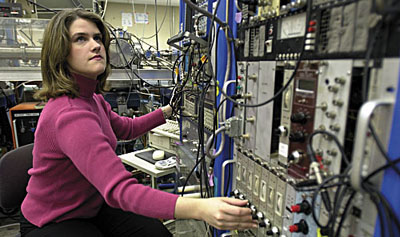Women in science and medicine face a variety of unique issues as they navigate through their professional careers.
Some support groups have formed at Yale that address these issues and serve as a forum for female science students, faculty and staff.
One such group is Women in Science at Yale, an undergraduate organization of women committed to the promotion of awareness and interest in academic and professional opportunities in science.
In addition to bringing speakers to campus to address issues of special concern to young women interested in pursuing careers in science, the group provides a supportive environment for discussion of common concerns and goals. The group's main goal is to maintain a network of interpersonal relationships among students interested in science.
The group also encourages women to participate in scientific opportunities and to develop contacts and/or relationships with mentors and potential role models. The group invites guest speakers to talk about current trends in today's society.
Formed in 2001 during Yale's Tercentennial celebration to highlight the presence of women at the university and the accomplishments of Yale alumnae, The Women Faculty Forum (WFF) is another group that focuses on advancing and supporting the careers of female professors across campus.
The group's main goal is to deepen understanding of the effects and implications of gender on all fields of thought. The group sponsors conferences, symposia and informal discussions. Group members are also working to strengthen and promote existing groups working on these issues in all of Yale's departments and schools, and to establish gender equity as a university policy. The group also promotes collegiality and networking on these issues between faculty, students, administration and alumnae.
Last fall, the WFF hosted a series of three programs exploring the topic "Science: Sex and Gender." The first was a discussion led by female researchers at Yale on the relevance of sex and gender on their work. They raised questions such as: "What is meant by the words sex and gender in the context of different areas of science?" And, "When does a scholar and researcher consider herself or himself as doing work to which either sex or gender is relevant?"
The second program was a discussion with Anne Fausto-Sterling, professor of biology and women's studies at Brown University, and author of the book, "Sexing the Body: Gender Politics and the Construction of Sexuality."
During the third program, Susan Silbey, professor of anthropology at the Massachusetts Institute of Technology, addressed the effects of the social structure on gender, sex and science.
The Office of Women in Medicine at the School of Medicine, directed by Merle Waxman, is another source of support for women at Yale.
It provides students, housestaff and faculty access to advisers and mentors; brings distinguished women in the medical sciences to the Yale School of Medicine as mentors and teachers; facilitates access by students to professional women in an informal setting; sponsors workshops and seminars on professional development and career opportunities for women in medicine and the sciences; and serves as a focus for the discussion and resolution of issues of interest to the medical school community.
Contents
Building for State-of-the-Art Research
Inspiring Future Science Leaders
Harnessing the Power of the Genome
Encouraging Women in the Sciences
Forging International Collaborations
Yale Dean Honored With Blue Planet Prize
Engineering the World of Tomorrow
Yale Engineer Receives National Medal of Technology
Promoting the Greening of 'The Blue'
Peabody Museum of Natural History:
Preserving the Past, Educating Future Generations
Bringing Yale Discoveries to The Public
Wright Nuclear Structure Laboratory: Probing the Power of Particles
More Yale Science News
Facilities Far and Near

 SPECIAL
SPECIAL ISSUE
ISSUE 2002-2003
2002-2003 |
| VOLUME 2, NUMBER 1
VOLUME 2, NUMBER 1
